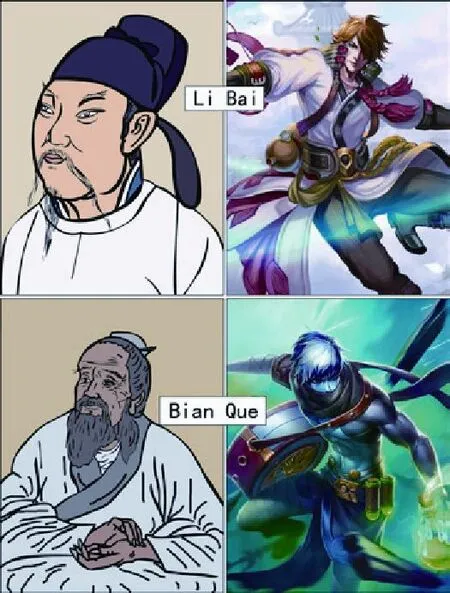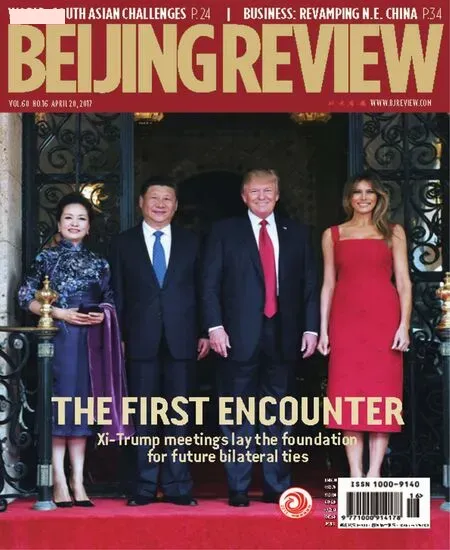Does Historical Distortion in Entertainment Mislead Children?
Does Historical Distortion in Entertainment Mislead Children?
Dear Readers,Forum is a column that provides a space for varying perspectives on contemporary Chinese society. We invite you to submit personal viewpoints on past and current topics (in either English or Chinese).
yanwei@bjreview.com
Please provide your name and address along with your comments
A popular mobile game,King of Glory, has recently come under fire for allegedly promoting inaccurate representations of ancient Chinese history, distorting historical fi gures’ true stories and statuses. For example, the game portrays famous Tang Dynasty poet Li Bai (701-762) as an assassin, while prestigious doctor Bian Que (407-310 B.C.) from the Spring and Autumn Period is cast as an expert on poisons. Over 60 characters in the game take on the names of well-known historical or legendary fi gures.
In 2016,King of Glorygenerated 6.8 billion yuan ($1 billion) in revenue, some 17.7 percent of the total revenue for mobile gaming in China. Many of the players are primary school students, who have little historical knowledge. Parents and teachers are worried that the distorted stories in the game will mislead children and ruin their outlook on history. However, some others argue that the game can do a lot of good, as it is likely to stimulate young students’ interest in history and inspire them to look more deeply into history.
Disrespecting history
Chen Qingpu (www.tianjinwe.com):King of Gloryis a multiplayer online battle arena game. With every player operating a role, this is a relatively simple game and is very popular with players. As for the distorted historical figures and invented stories, it’s all right if the players are adults, but if they are primary school students, this game risks imposing false history on them.
The creation of mobile games is a kind of art. As long as it is art, fabrication is inevitable. However, this does not mean that game developers can distort history at will. Currently, you may find ridiculous arrangements of characters in a lot of online games. To some extent, this phenomenon reveals game companies’ pursuit of prof i t and their reluctance or incapacity to create their own stories. To make games based on well-known historical figures proves much easier than to create new characters.
Yang Yafei (Beijing Evening News): It’s known thatKing of Gloryis a big mess, with figures from history, legends and novels. Every player can fight in the game by playing the role of one of the characters. Some adults say even they are so confused by the game that they have to go back to history books to confirm whether their knowledge of history is right or not. What do you expect this game to bring to young pupils, who mostly have little historical knowledge and are much more vulnerable to distorted history than adults?
The game should categorize its many characters in chronological terms. If every character in the game represents a historical figure correctly—as recorded in history materials—players, particularly teenagers, will benef i t from the game, instead of being confused by it.
Innovation is something we all advocate, but when it comes to mobile games, the bottom line is to respect basic historical common sense. China’s rich history and culture are not supposed to be consumed or even trampled in this way. We hopeKing of Glorywill help inspire young people’s interest in history, instead of ruining time honored Chinese civilization.
Deng Haijian (China Education Daily): Times, places, figures and events are the basic elements of history, butKing of Glorydistorts these basic elements. When even adults complain that they are bewildered by the game, is it plausible that this game can help pupils learn history?
There are some worrying statistics: This mobile game has attracted more than 100 million players around the country. Although the game developer suggests that the players should be at least 16 years old, 54 percent of them are reportedly aged between 11 and 20.
We don’t regard mobile games as ogres, but for pupils who lack basic historical knowledge, this time-traveling mobile game is harmful. Pupils are still at the stage of developing their outlook on history and the world. Any kind of distorting and entertainmentoriented explanation of history will erode history education at school.
The controversy over this mobile game fully ref l ects the lack of a sense of social responsibility on the part of the game developer. A wave of innovation is sweeping various sectors of the nation’s economy nowadays. It’s therefore especially important to impose discipline on culture and history-related products and to make these products respect basic historical common sense and rules. Commercial activities should be based on fundamental ethics, while innovation should not cross ethical boundaries. Game companies are supposed to spend more time developing their own stories and brands, instead of taking advantage of historical fi gures and distorting history at the same time.
The precondition for spreading traditional culture is to pay homage to history and have a basically correct attitude towardtradition. To freely distort and fictionalize historical stories and figures amounts to damaging history and culture.

This mobile game-related debate also implies a lack of effective supervision of the cultural industry. Some propose that minors should be banned from playing this game. This proposal of course goes too far. However, a strict game rating system seems urgent.
Pan Jian (Guangming Daily): The government has long called on those engaged in the cultural industry to contribute to the common good of society. It is categorically opposed to the use of indicators such as audience numbers and box-office receipts as the only yardsticks of success. Like TV programs and movies, games exert subtle influences on players. They not only are a form of entertainment, but also can play an informative and educational role. Games that misrepresent history are detrimental to the preservation of Chinese cultural heritage.
Sparking interest
Liu Yijie (China Education Daily): Some argue that mobile games likeKing of Gloryare misleading players and ruining historical and cultural heritage. They have exaggerated the inf l uence of mobile games.
It takes time to grow up and get to understand the world. The game may present historical fi gures not matching their original identity, but this does not affect pupils’understanding of history when correct historical knowledge begins to accumulate, replacing the wrong understanding. From children’s perspective, mobile games are entertainment, just like the game of hide-andseek.King of Gloryis unlikely to be seen as a history book.
It’s unrealistic to pin hopes for history education on mobile games. History education is the responsibility of schools and parents. If they do well enough in this regard, there will be no need to worry about children being misled by games.
Many people read kungfu fiction set in certain historical periods. Instead of being misled, they become increasingly interested in history by being exposed to these stories, despite the many inventions they contain. The point now is not to argue whetherKing of Glorymisrepresents history and misleads children, but to make the most of the game to inspire children and guide their interest toward serious history.
Jing Yiming (Beijing Evening News):King of Gloryis not the fi rst game based on historical figures, and neither is it the first one that hugely distorts history. The question is: Will children be misled by the game, as many parents fear?
According to Zong Chunshan, a child education specialist, parents don’t need to worry too much about pupils’ cognitive abilities. He said that children at this age have already developed the ability to tell fiction and reality apart. During primary school, children are usually very imaginative, and even without such mobile games, they tend to find something similar to satisfy their imaginations.
Of course, impacts, positive or negative, from the game are inevitable, and it all depends on parents’ guidance. Possibly, children will begin to ask what kind of people the game figures were in real history, after their interest is stirred up by the game. In this case, parents should seize the opportunity to present authentic history books to children or even take them to visit historical sites, so as to expand their knowledge and understanding of these figures and the related history. If parents can make good use of the opportunities presented by the game,King of Glorywill not necessarily be a misleading mobile game. ■
Copyedited by Chris Surtees

